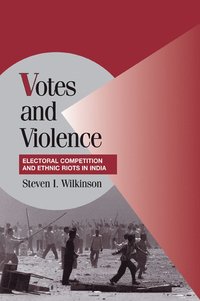
- Format
- Häftad (Paperback)
- Språk
- Engelska
- Antal sidor
- 312
- Utgivningsdatum
- 2006-11-01
- Upplaga
- New ed
- Förlag
- Cambridge University Press
- Medarbetare
- Steven I., Wilkinson
- Illustrationer
- 6 half-tones 5 maps
- Volymtitel
- Votes and Violence: Electoral Competition and Ethnic Riots in India
- Dimensioner
- 230 x 150 x 14 mm
- Vikt
- Antal komponenter
- 1
- Komponenter
- 2:B&W 6 x 9 in or 229 x 152 mm Perfect Bound on Creme w/Gloss Lam
- ISBN
- 9780521536059
- 320 g
Votes and Violence
Electoral Competition and Ethnic Riots in India
- Skickas från oss inom 7-10 vardagar.
- Fri frakt över 249 kr för privatkunder i Sverige.
Passar bra ihop
De som köpt den här boken har ofta också köpt Who's Afraid of Gender? av Judith Butler (inbunden).
Köp båda 2 för 700 krKundrecensioner
Fler böcker av Steven I Wilkinson
-
Army and Nation
Steven I Wilkinson
At Indian independence in 1947, the countrys founders worried that the army India inheritedconservative and dominated by officers and troops drawn disproportionately from a few martial groupsposed a real threat to democracy. They also saw the stru...
Recensioner i media
'In this important book, Wilkinson provides strong arguments against some prevailing theories concerning the causes of interethnic violence in competitive political regimes, including those that associate it with state strength or weakness, the presence or absence of consociational arrangements and practices, or 'civic engagement' through 'interethnic associations'. To the contrary, he provides persuasive evidence, from contemporary India and other parts of the world, that electoral calculations and governmental will are decisive factors in promoting or preventing interreligious and interethnic violence.' Paul R. Brass, Professor Emeritus of Political Science and South Asian Studies, University of Washington
'Wilkinson combines area expertise with a mastery of the literature and theoretical and methodological sophistication. He leaves little doubt as to the validity of his claims that electoral competition is causally related to ethnic rioting in India and demonstrates that state weakness or economic competition alone cannot explain the complexity of ethnic violence. By expertly linking the broader comparative politics literature on electoral politics to the literature on ethnic violence, Wilkinson raises the bar for scholars working on the political economy of violence.' Nicholas Sambanis, Yale University
'In the 1990s, a strikingly odd argument emerged in some quarters that a scientific study of comparative politics necessarily required comparison across countries. This book is a striking proof of the counter-argument that countries are not cases that scientific in-country comparisons can be made, if states, provinces or cities of a country are the legitimate units of analysis; that science depends not on where one studies a problem, but on how one studies it. Even when I disagreed with the substantive arguments of this book, I greatly admired the methodological sophistication Wilkinson brought to bear on a truly interesting social science question: how does one explain why some parts of a country often have ethnic violence, whereas other parts remain quiet?' Ashutosh Varshney, University of Michigan, Ann Arbor
'Wilkinson's volume is a valuable addition to the literature on ethnic violence in general and ethnoreligious violence in India in particular.' Nations and Nationalism
Övrig information
Steven I. Wilkinson is Nilekani Professor of India and South Asia and Professor of Political Science and International Affairs at Yale University. Votes and Violence: Electoral Competition and Ethnic Riots in India was co-winner of the American Political Science Association's 2005 Woodrow Wilson Foundation prize. He is currently researching the links between colonial inheritances and post-independence levels of democracy, governance and conflict.
Innehållsförteckning
List of figures; List of tables; Acknowledgments; 1. The electoral incentives for ethnic violence; 2. Explaining town-level variation in Hindu-Muslim violence; 3. State capacity explanations for Hindu-Muslim violence; 4. The consociational explanation for Hindu-Muslim violence; 5. The electoral incentives for Hindu-Muslim violence; 6. Party competition and Hindu-Muslim violence; 7. The electoral incentives for ethnic violence in comparative perspective; 8. Democracy and ethnic violence; Appendices; References; Index.
Du kanske gillar
-
Transformed
Marty Cagan
Inbunden


